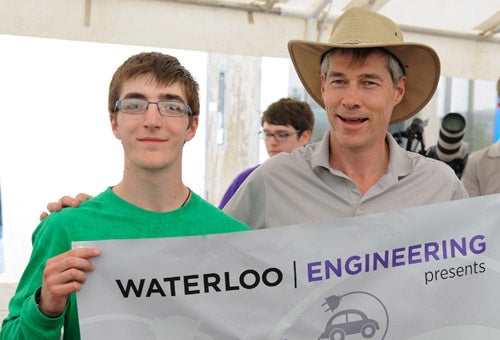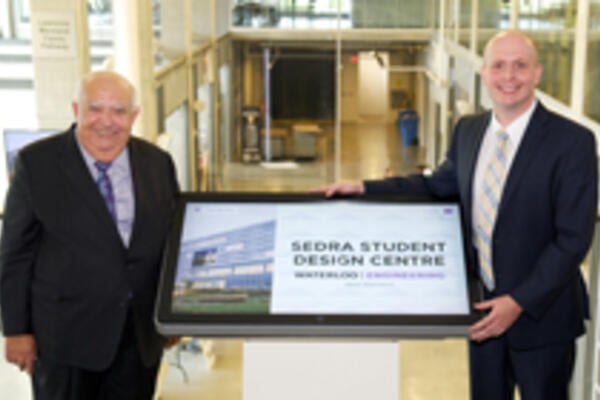
Electric car challenge helped pave the way for incoming student
Matt Rose learned how to bounce back from failure while building a prize-winning electric car in high school

Matt Rose learned how to bounce back from failure while building a prize-winning electric car in high school
By Brian Caldwell Faculty of EngineeringMatt Rose figures he learned more in high school as a member of the prize-winning electric car team than he did in a lot of his academic classes.
But as he starts the mechatronics engineering program at the University of Waterloo this fall, the lasting lesson he brings with him has as much to do with repeated failure as it does with eventual success.
“Nothing works the first time,” said Rose, 17. “You’ve always got to figure out a solution to a problem that you didn’t see coming.”
That assessment is music to the ears of Jamie Cox, his teacher supervisor at Bluevale Collegiate Institute in Waterloo, and Peter Teertstra, director of an annual competition for high schools hosted by Waterloo Engineering.
In addition to specific skills such as design and fabrication, they say the Waterloo Electric Vehicle Challenge teaches teenaged students the importance of teamwork, determination and perseverance by marrying theory with a hands-on project.
“I think they learn what they’re capable of,” said Teertstra, a mechanical engineering lecturer and director of the Sedra Student Design Centre.
Inexpensive and open to a broad range of students, the event tasks teams to design and build battery-powered, three-wheeled cars, then go head-to-head in an endurance race to test their efficiency.
The payoff for a year of after-school work, the race has grown steadily since the University began hosting it in 2012 and Teertstra believes it has the potential to explode from about 15 teams to 100 or more in the next five to 10 years.
Its appeal, he said, is exactly what hooked Rose for all four years he was in high school – “experiential learning” that melds theory with practical application, long a core approach at Waterloo.
“I think it boils down to the pride of accomplishment and the enjoyment that’s derived from building something,” said Teertstra, who can relate after making, driving and, mostly, fixing a go-kart as a boy.
Cox, who typically has 15 to 25 members on his teams at Bluevale, said most new students are surprised how difficult it is to produce a working car.

Matt Rose, left, now a first-year engineering student, accepts a design award from organizer Ross McKenzie at the annual Electric Vehicle Challenge held at the University of Waterloo.
But when they stick with it, he said, the trial-and-error process, often capped by marathon sessions in the shop as race day approaches in late May or June, is a valuable lesson in itself.
Cox especially likes how winning results depend on students with different, complementary abilities, with academic achievers collaborating with students from the shop wing to bring their designs to life.
“This is too complex a project for any one person to be successful,” Cox said. “They have to work in teams.”
Thanks primarily to a provincial grant for engineering outreach in high schools, new teams are provided with $1,500 starter kits – three wheels, a motor, a battery and a controller – leaving them to come up with about $500 worth of other parts and materials.
Part of the project involves seeking sponsors, an element that draws in students with even more diverse interests and abilities. Cox has had some join just to design the team T-shirt.
Divided into 12-volt and 24-volt classes, the race involves cars travelling up to about 30 km/h while making as many circuits as possible in a set time on a course on the East Campus. There are also awards for engineering excellence and the top first-year team.
With sponsors including Toyota, Interstate Batteries and the Trillium Automobile Dealers Association already on board, Teertstra is hoping to attract others as participation increases.
As for Rose, he expects the experience of trying, trying and trying again, will make him a better engineer one day.
“It can be pretty challenging sometimes, but it’s all worth it when you get to see your car racing around the track,” he said.

Read more
Special issue of Waterloo Magazine celebrates women who lead, and explores equity in education and the workplace

Read more
Student Design Centre – where students fall "in love with engineering" – is named in honour of Adel Sedra

Read more
Here are the people and events behind some of this year’s most compelling Waterloo stories
Read
Engineering stories
Visit
Waterloo Engineering home
Contact
Waterloo Engineering
The University of Waterloo acknowledges that much of our work takes place on the traditional territory of the Neutral, Anishinaabeg, and Haudenosaunee peoples. Our main campus is situated on the Haldimand Tract, the land granted to the Six Nations that includes six miles on each side of the Grand River. Our active work toward reconciliation takes place across our campuses through research, learning, teaching, and community building, and is co-ordinated within the Office of Indigenous Relations.